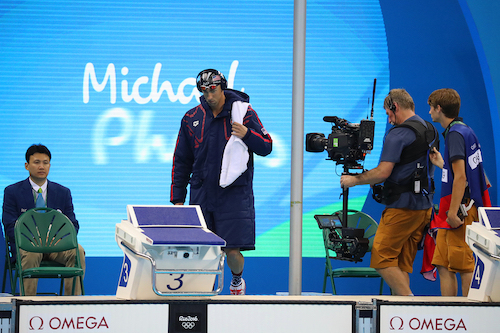 A figure stands behind the blocks at the pool. The crowds around him cheer and wave flags. Cameras pan across his competitors, against whom he will battle it out in the water over a stretch of 200 meters.
A figure stands behind the blocks at the pool. The crowds around him cheer and wave flags. Cameras pan across his competitors, against whom he will battle it out in the water over a stretch of 200 meters.
It’s 2016 and the Rio Olympics is in full swing, swimmer Michael Phelps is about to compete in the 200-meter men’s butterfly final.
The camera focuses in on his face, and he appears to be glaring. The look earns the name “Phelps face”, a version of an idea familiar to most athletes: game face.
Whether under direction from a coach, or as a ritual pre-competition, athletes around the world can be seen prior to their events with a serious face.
Now new research from experimental psychology researchers at the University of Tennessee Knoxville has found game face may actually make a difference, and not just for athletes.
“Making a game face may help with performance. Specifically, we have shown that it may be helpful in a cognitive task. Generally, we see the game face in athletics involving physical stressors, while this study suggests that putting on a game face for something cognitive like test taking might lead to better results,” Matthew Richesin, lead author of the study and a master's student at UT told Theravive.
Richesin was inspired to investigate game face, after seeing football shirts around campus encouraging a game face.
“I started the study because I had played sports throughout childhood and had often heard the term "put your game face on". It was never something that was explained but everyone seemed to know what it was. I thought of it again when I saw t-shirts for Tennessee football that said "get your game face on" and thought maybe we could test if that really does help,” he told Theravive.
Anecdotally, many athletes have noted that having a game face helps with performance, but Richesin found there was little scientific research to back it up.
In undertaking their study, researchers conducted two experiments. In both experiments, one group of those participating saw images of public figures or athletes displaying a game face. After this, the participants were asked to show a face of “intense determination” whilst they performed a physical task and a cognitive task.
For the physical task, the participants were asked to put their hand in a container filled with ice water for up to five minutes. Half of those participating were asked to show a game face whilst completing the task, whilst the other group wasn’t given a specific instruction regarding facial expression.
The researchers found no difference in physical performance between the groups, however they found that those participants who were not specifically asked to display a game face whilst their hand was submerged in ice water still showed similar facial expressions.
In the second experiment, participants were asked to complete as much of a 100 piece puzzle as they could in five minutes. One group was again told to have a game face whilst completing the task, whilst the other group was not given specific instructions.
The researchers found that those in the group that displayed a game face performed 20 per cent better on average than the non-game face group. They also showed better stress recovery than the other group.
“We found that using a game face increased performance in a cognitive puzzle task. We did not find evidence that it increased performance in a cold pressor task (submerging hand in near freezing water for as long as possible). However, we noticed that participants would make a face similar to a game face in preparation or response to the cold pressor on their own. It may be that participants spontaneously are more likely to make a game face in response to a painful stressor and less likely for cognitive stress but we don't have empirical evidence to support it in this study, we just made the observation while running participants,” Richesin said.
The study findings support previous research which has found facial manipulation can positively impact mood. Researchers say more work needs to be done to determine how much benefit can be gained from game face, and the underlying mechanisms which contribute to that.
“Moving forward in this area we need to refine the methods so we don't see people display a spontaneous game face without instruction. This way we can get proper measure for more physical stress such as pain in the cold pressor or some athletic challenge,” Richesin said.
“In regard to the cognitive tasks, we need to test the game face on different cognitive challenges such as mental arithmetic, reading comprehension, or even measures of reaction time. This will give us a better understanding of the benefits provided by making a game face.”
Elizabeth Pratt is a medical journalist and producer. Her work has appeared on Healthline, The Huffington Post, Fox News, The Australian Broadcasting Corporation, The Sydney Morning Herald, News.com.au, Escape, The Cusp and Skyscanner. You can read more of her articles here. Or learn more about Elizabeth and contact her via her LinkedIn and Twitter profiles.